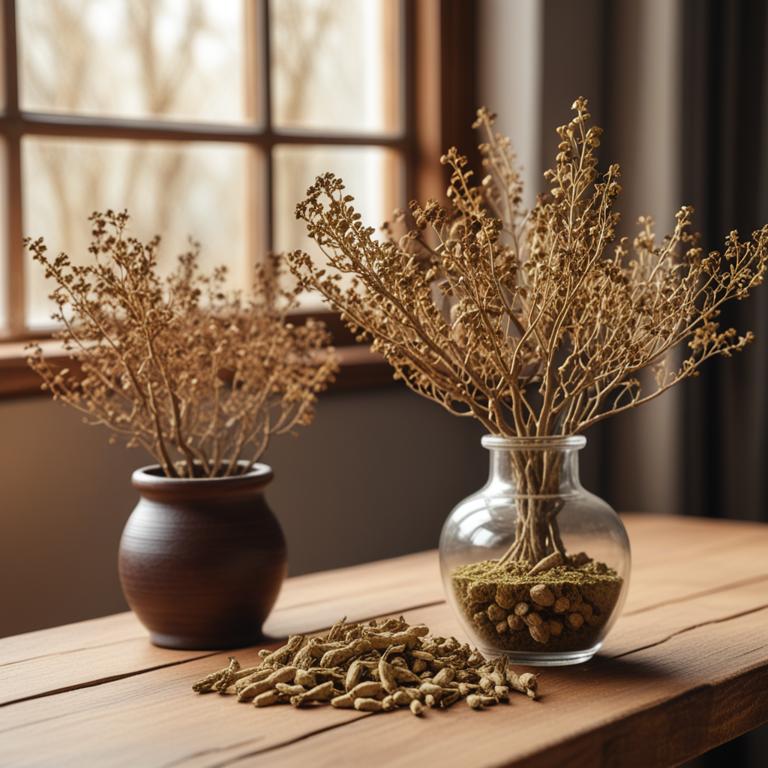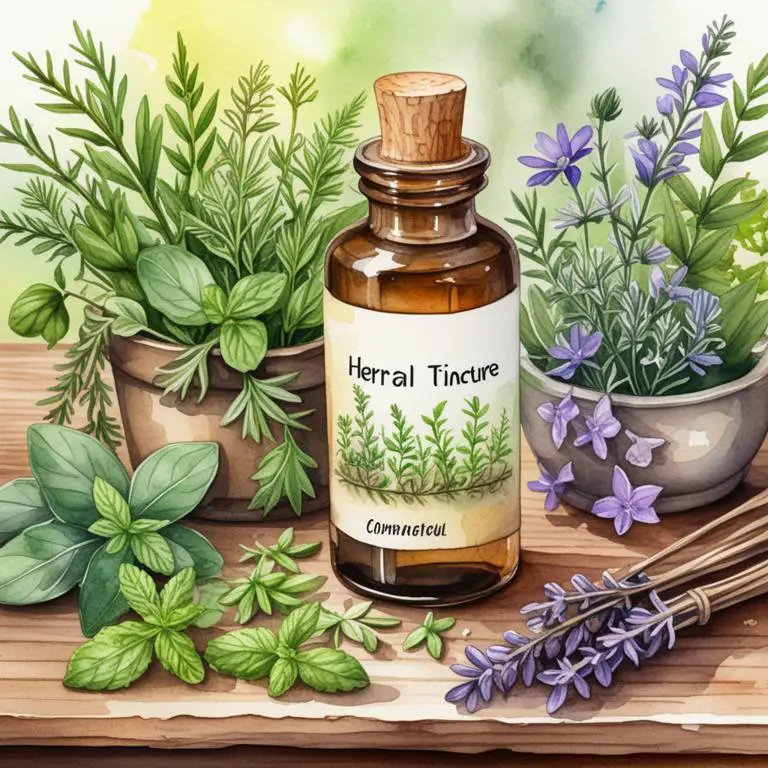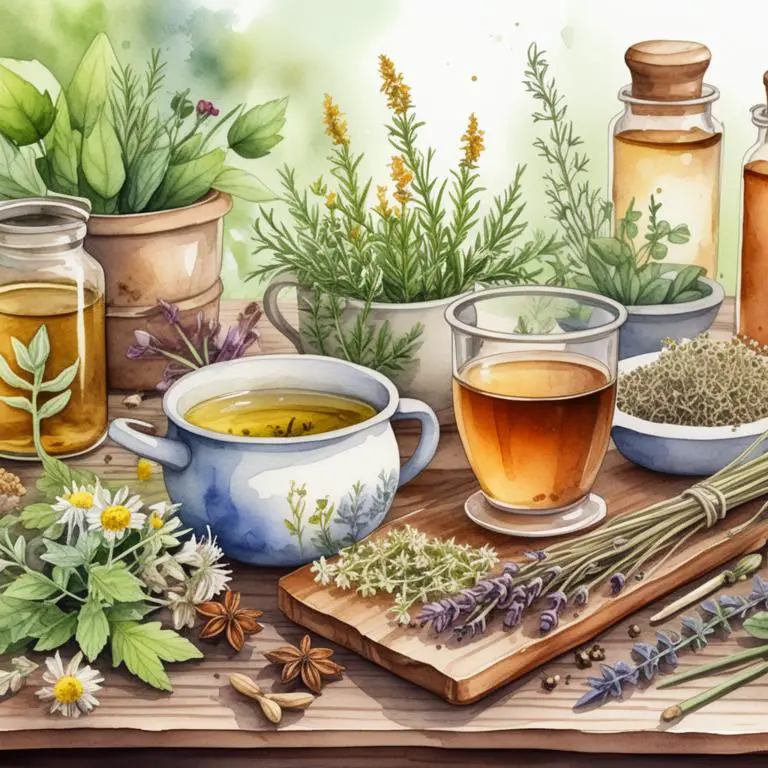Updated: Dec 1, 2024
Stomach Cramps: Effective Herbal Preparations and Medicinal Plants
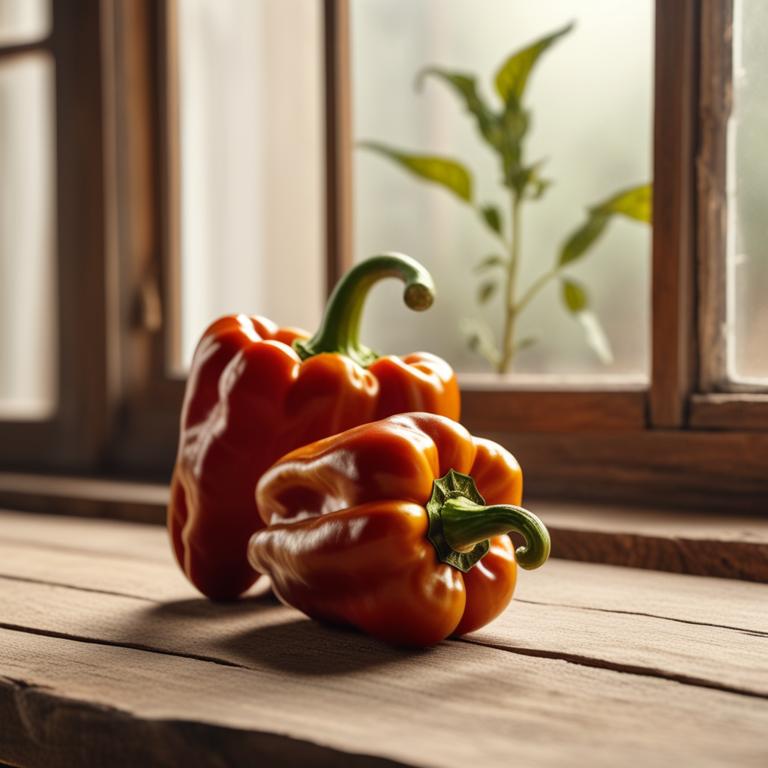
Stomach cramps can be a real nuisance, making it difficult to eat, sleep, and even go about your daily activities.
It's a sharp, stabbing pain in your abdomen, often accompanied by nausea and vomiting. Stomach cramps can be caused by a range of factors, including eating something that doesn't agree with you, a virus or bacterial infection, or even stress and anxiety. If you're experiencing frequent or severe stomach cramps, it's essential to speak with a healthcare professional to rule out any underlying conditions. Herbal remedies have been used for centuries to soothe stomach cramps.
Peppermint, ginger, and chamomile are popular choices for their anti-inflammatory and calming properties. These herbs work by relaxing the muscles in your stomach and reducing inflammation. You can consume them in various forms, such as teas, capsules, or even essential oils. For example, you can make a soothing tea by steeping dried peppermint leaves in hot water or drink a ginger tea to help calm your stomach.
You can also add a few drops of peppermint oil to a warm bath to help ease cramps and promote relaxation.
Table of Contents
What causes stomach cramps to occur?
The main causes of stomach cramps are usually related to problems with digestion, infections, or other health issues.
One common cause is food poisoning, which occurs when you eat contaminated food that has bacteria like E. coli or Salmonella. These bacteria can cause your stomach to become inflamed and crampy. Appendicitis is another cause of stomach cramps. This is when your appendix, a small organ near your large intestine, becomes infected and inflamed. The pain from appendicitis can start near your belly button and move to your lower right abdomen, causing cramps.
Irritable Bowel Syndrome (IBS) is a condition that affects the way your digestive system moves food through your body. People with IBS may experience stomach cramps, bloating, and changes in bowel movements. The exact cause of IBS is not known, but it's thought to be related to changes in the way your gut responds to stress. Constipation is a common cause of stomach cramps, especially in people who don't eat enough fiber or drink enough water. When your colon becomes too full of waste, it can cause cramps and discomfort. Finally, diarrhea can also cause stomach cramps.
When your body has too much water in your intestines, it can cause the muscles in your digestive system to contract and relax quickly, leading to cramps.
What benefits can be gained from using herbs to alleviate stomach cramps?
Using herbs for stomach cramps can be really helpful because they can calm down the muscle spasms and reduce inflammation.
These herbs work by relaxing the muscles in the stomach and intestines, which can get irritated and cramp up when you eat something that doesn't agree with you. They can also help to soothe any irritation or inflammation in the digestive tract, which can cause pain and discomfort.
Some herbs can even help to ease nausea and vomiting, which can be a big relief if you're feeling queasy. Additionally, these herbs can help to regulate digestion and improve the overall functioning of your digestive system, which can prevent stomach cramps from happening in the first place.
They're also often gentle and non-irritating, making them a great option for people who are sensitive to medications or have other health conditions.
What are the main stomach cramps medicinal herbs?

Herbs have been used for centuries to alleviate stomach cramps, and for good reason.
One of the most effective is ginger, or Zingiber officinale, which has natural anti-inflammatory properties that help to soothe the digestive tract and reduce pain. Another popular herb is fennel, or Foeniculum vulgare, which has a calming effect on the stomach muscles and can help to ease cramps.
Licorice root, or Glycyrrhiza glabra, is also a great remedy, as it can help to balance the body's natural hormones and reduce inflammation in the digestive system. Peppermint, or Mentha x piperita, is another herb that can provide quick relief from stomach cramps, as its cooling properties can help to calm the stomach and reduce nausea. Finally, turmeric, or Curcuma longa, contains a powerful anti-inflammatory compound called curcumin, which can help to reduce pain and inflammation in the digestive tract and alleviate cramps.
These herbs work together to provide natural relief from stomach cramps, and can be consumed in the form of teas, capsules, or added to food.
Which herbal preparations are most frequently used to treat stomach cramps?
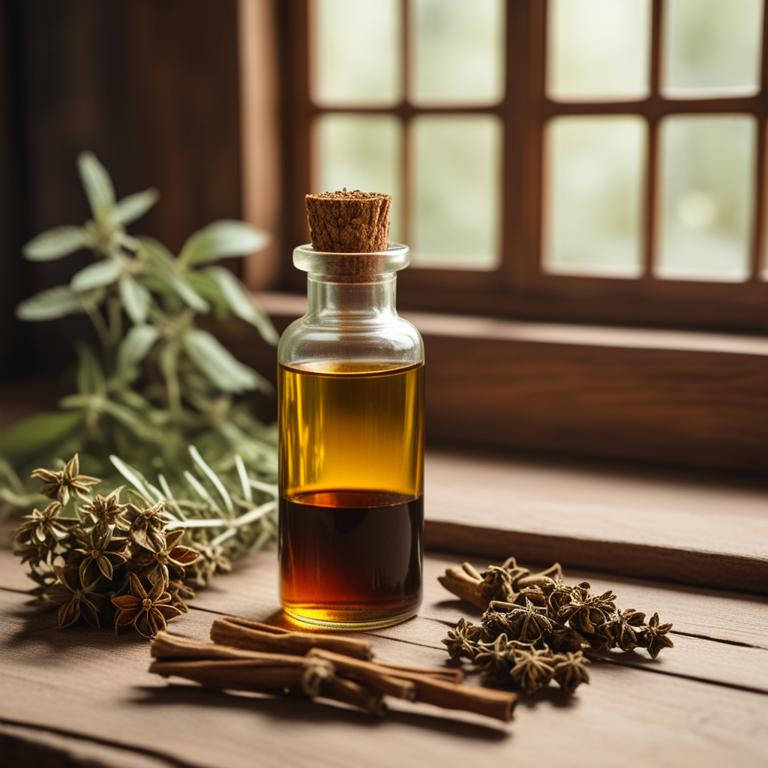
If you're experiencing stomach cramps, herbal preparations can be a great way to find relief.
A decoction is a strong tea made by simmering herbs in water, which helps to release their active ingredients. This method is particularly effective for herbs like ginger, which has anti-inflammatory properties that can help to soothe cramps. On the other hand, an infusion is a delicate tea made by steeping herbs in hot water. It's a good choice for herbs like peppermint, which has a calming effect on the stomach and can help to ease cramps. A tincture is a concentrated liquid extract of herbs, which can be taken in small doses to provide quick relief from stomach cramps.
Tinctures made from herbs like chamomile and valerian root are particularly effective at promoting relaxation and reducing cramp severity. If you prefer to take your herbs in a more convenient form, a capsule is a great option. Capsules contain a measured dose of dried herbs, which can be easily swallowed and absorbed by the body. Finally, a poultice is a warm compress made from crushed herbs, which can be applied directly to the stomach to provide relief from cramps. This method is particularly effective for herbs like chamomile and lavender, which have anti-inflammatory properties that can help to soothe and calm the stomach.
Herbal preparations like decoctions, infusions, tinctures, capsules, and poultices can be a great way to find relief from stomach cramps, and they offer a natural alternative to over-the-counter medications.
Additional Resources:
Are there any herbs that may exacerbate stomach cramps?
If you're experiencing stomach cramps, it's best to steer clear of certain herbs that can make the problem worse.
Taxus baccata, also known as yew, contains toxic compounds that can harm your liver and exacerbate stomach pain. Cinchona officinalis, or Peruvian bark, is rich in quinine, which can irritate your stomach lining and worsen cramps.
Datura stramonium, or jimsonweed, is a potent herb that can cause nausea and stomach discomfort due to its anticholinergic properties. Similarly, Hyoscyamus niger, or henbane, contains scopolamine, a substance that can slow down digestion and irritate your stomach. Rauvolfia serpentina, or snake plant, can also cause stomach upset due to its alkaloids, which can disrupt digestion and worsen cramps.
When your stomach is already inflamed, it's best to avoid these herbs and opt for gentler remedies that can help soothe your stomach and alleviate cramps.
FAQ
Are there any specific herbs that can prevent stomach cramps?
Ginger and peppermint are often used to ease stomach cramps.
Ginger helps calm the stomach muscles and reduce inflammation. Peppermint oil can also soothe the digestive system and relax the muscles.
Some people drink ginger tea or take peppermint supplements to help with stomach cramps, but it's best to try these herbs in moderation and see how they work for you.
Is it safe to use herbal remedies for stomach cramps during pregnancy?
When it comes to stomach cramps during pregnancy, some women turn to herbal remedies.
However, it's essential to be cautious. Certain herbs can cause problems, like uterine contractions or allergic reactions.
Peppermint oil or ginger tea might help with mild cramps, but it's crucial to talk to your body and listen to how you feel.
Are there any herbs that can reduce the frequency of stomach cramps?
Ginger has been shown to help with stomach cramps.
Its active compounds can ease muscle spasms and reduce inflammation. Peppermint oil also has a soothing effect on the stomach, which can help calm cramps.
These herbs may help reduce the frequency of stomach cramps by promoting digestion and relaxation.
Can i combine different herbal remedies for stomach cramps?
You can try combining different herbal remedies for stomach cramps, but be careful.
Some herbs can interact with each other. For example, peppermint and ginger can work together to calm your stomach, but if you add chamomile, it might slow down digestion too much.
Just start with small amounts and see how your body reacts.
Related Articles
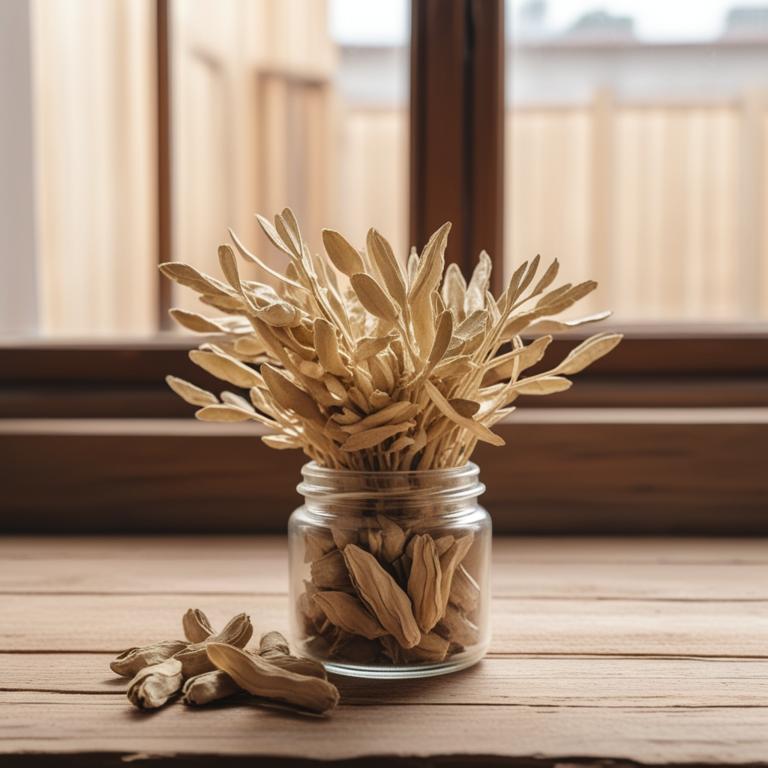
Understanding Chronic Hepatitis: Causes and Effective Herbal Remedies
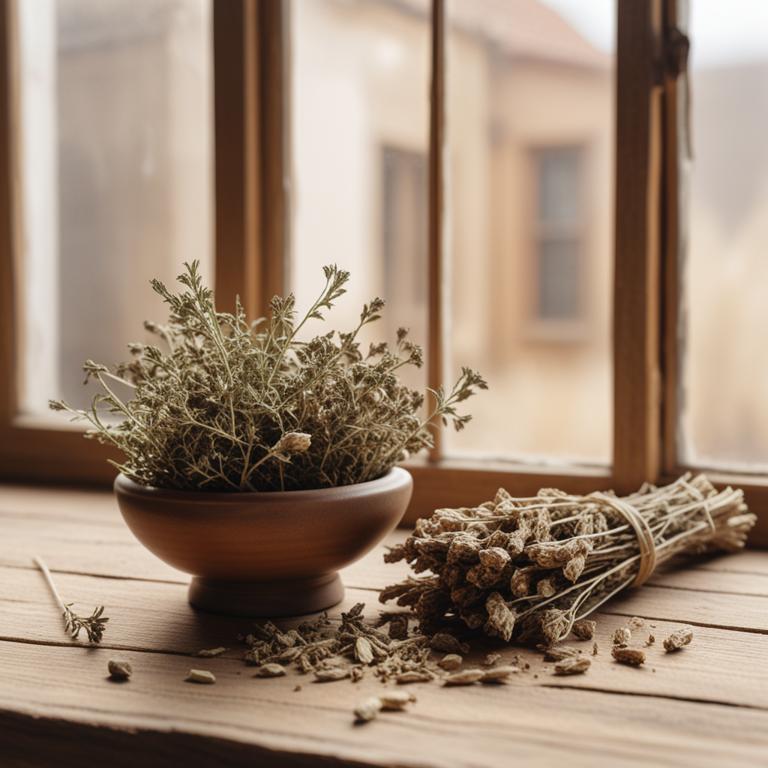
Stomach Cramps: Effective Herbal Preparations and Medicinal Plants
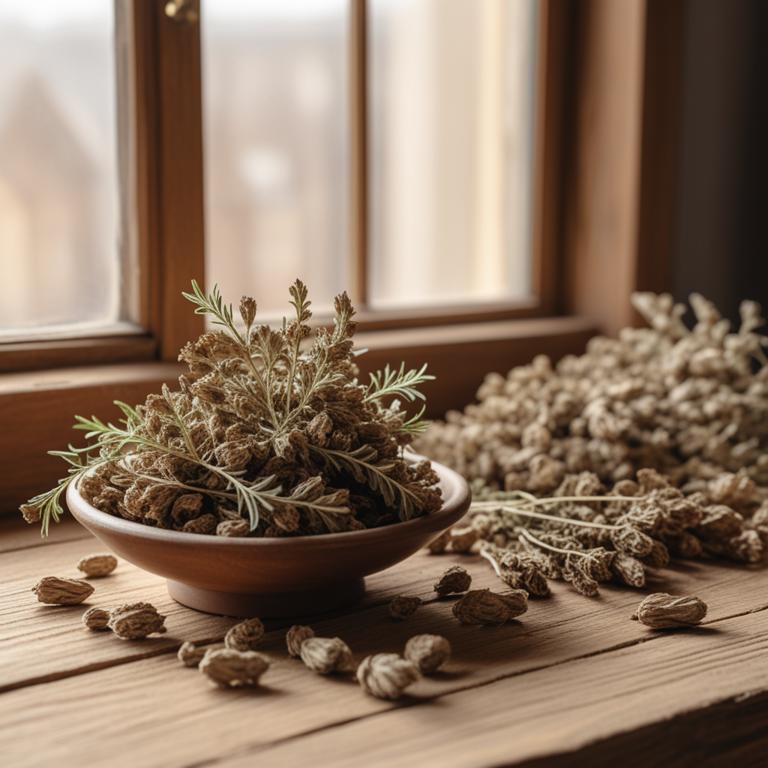
Diverticulitis Causes, Herbal Remedies, and Alternative Approaches to Healing

Overcoming Loss of Appetite: Causes, Medicinal Herbs, and Herbal Remedies
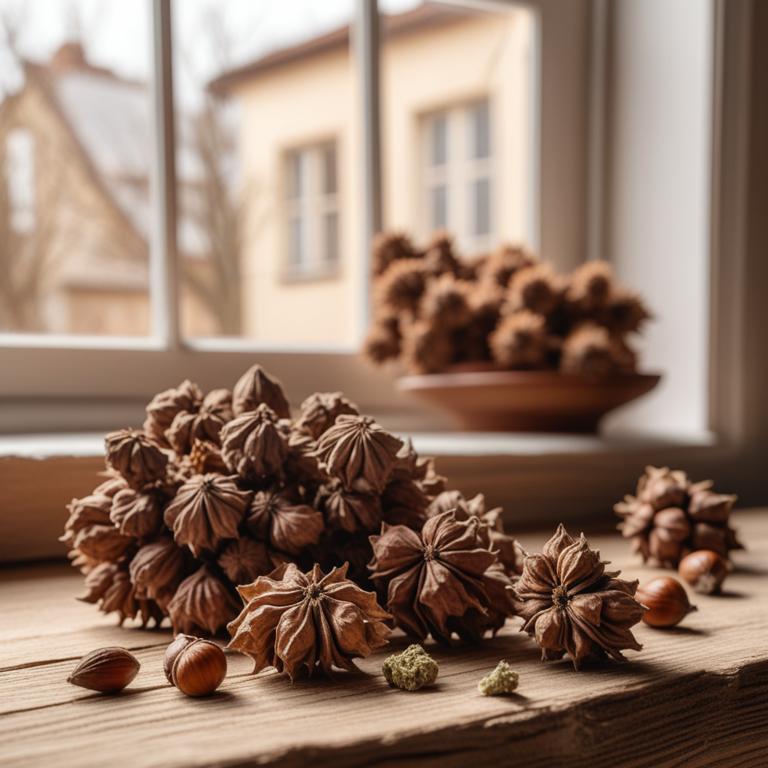
Constipation Prevention and Treatment with Herbal Preparations




